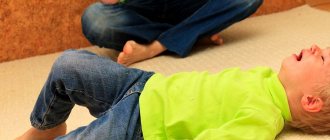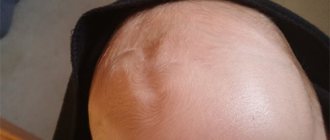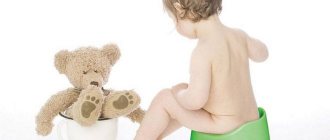Don't panic
Usually babies up to two months sleep soundly and do not pay attention to extraneous external stimuli. However, after two months, suddenly they begin to respond to any sounds. Of course, this causes some concern for parents, since children sometimes become hysterical and it is difficult to calm them down.
Experts say: don't panic. There is no reason to worry. From two months to a year, and in some children up to two years, the nervous system develops. Crying is a normal reaction to an external stimulus, since the child has little auditory experience.
Under no circumstances should you shout at a child, spank him on the bottom, etc.
Here's what you need to do to stop your baby from overreacting to loud noises.
Why is a 2-3 year old child afraid of loud sounds?
Children at an early stage of development (from several months to 1-1.5 years) are frightened by loud and sharp sounds. This is a normal manifestation of the instinct of self-preservation - too much noise can cause loss of ear sensitivity and hearing impairment. There is no need to be nervous or worried when two-year-olds experience fear from loud noises; this is a normal manifestation of the fact that their nervous system is at a developmental stage. It is more sensitive than in adults. This phobia usually goes away at about three years of age.
If a child at 5-6 years old is still afraid of loud sounds, then parents should consult a doctor. Such manifestations indicate that the baby’s nervous system is too sensitive.
The cause of fear can also be the parents’ overly emotional reaction to the situations in which the little researcher finds himself. If mom keeps shouting: “Don’t do this, don’t touch, don’t interfere!”, this can cause severe stress. It is better to speak to children kindly and calmly, letting them know that they are protected and nothing bad will happen.
Calm the child
It doesn't matter if your baby talks or not, you still need to communicate with him. Reassure the baby, tell him that he is completely safe. Speak quietly without raising your voice. You can take the child in your arms so that he feels that he is protected and that nothing threatens him.
Make sure your baby hears not only your feminine voice, but also your masculine one. Let the father communicate with the child more often. If dad is not there, then invite one of your close relatives or male friends. This is very important because the vibrations of women's and men's voices are different. To replenish the auditory experience, it is important that the baby hears both.
How to live for free in Greece from April 5 to May 3, 2021: the hotel is holding a competition
I’ve been making “marble roll” for many years: we put it on sandwiches instead of sausage
Unexpected and high-profile divorces that surprised and upset us in 2020
The child tolerates noise painfully
First day of kindergarten...
- Mom, they scream all the time! I won't go there again. My ears hurt. - Bunny, well, you can shout with them, it’s fun.
A look full of amazement and sometimes even disbelief.
- No, this is not fun for me.
With each day spent in kindergarten, the child withdraws more and more into himself. Instead of making new friends, he sits in a corner alone. Does not make contact, refuses group games and activities. He is happy to be left alone at home, just not to go to the garden. Moreover, after several days spent at home, a noticeable improvement is observed. The baby feels better, enjoys going for walks, playing, and interacting with children.
What happens to the child? What is the reason for this reaction to noise? How to help a child in a stressful situation? Perhaps he is still too small for the garden and is better off staying at home?
What if this is some kind of manipulation of parental love? If he just wants to be pampered, pitied and followed his lead? Maybe not everything in the team is as bad as it seems?
Or does the child suddenly have a problem with communication? Perhaps these are the first signs, and it’s worth contacting specialists in time to correct your behavior?
The answers to these questions lie in the characteristics of the child’s psyche, namely, the properties of the sound vector.
Don't strive for perfect silence
Many parents make a grave mistake when they do everything possible to ensure that there is ringing silence in the nursery. This is wrong, because you need to accustom the child to different sounds. Let him learn to fall asleep with the TV, radio on quietly, your quiet conversations with someone in the household, etc. Then adaptation will take place, and you will not face the problem of fear of loud sounds.
By the way, it will also be easier for the child in the future. For example, many children whose parents created ideal conditions at home were unable to concentrate and write a test in class because they were irritated by noise.
When the landscape presses on your ear
System-vector psychology Yuri Burlan explains this child’s behavior by the lack of skill to adapt to sound stress. However, this skill can and should be developed. The main thing in this matter is to approach the matter systematically and find the exact balance between “develop” and “harm.”
A child's auditory sensor with a sound vector is a hypersensitive instrument for which loud noise or screams can be too strong a stimulus, causing a stress reaction.
Why doesn't this happen in adults?
Because an adult sound specialist has already learned to adapt to noise, although being in a super-noisy environment for a sound engineer in balanced states will never become pleasant.
The child is just beginning his path of development of the sound vector, and, of course, manifests himself directly - in the case of a large sound load, he “leaves” the painful environment by immersing himself in himself.
Of course, in a stressful situation, a little sounder is not able to actively make contact, form friendships or perform any tasks. In addition, such a child, due to his psychological characteristics, does not immediately react to speech addressed to him, and with a noise load it will be even more difficult to build a communication bridge.
The properties of the sound vector are manifested by the child’s introverted behavior; he is constantly in his own world, continuing the internal dialogue, going through the chain of his thoughts. For this reason, the erroneous impression of some kind of inhibition is often created, of lagging behind other, more active and nimble children.
In order to respond to speech addressed to a child, to answer a question, the sound engineer needs to get out of his own thoughts and create a communicative connection, shift the focus of attention from the inside to the outside, which may take several seconds. This is also related to the little sound guy’s habit of constantly asking: “Huh?”, “What?”, despite the fact that he hears better than everyone else.
In addition, it is the sound child who does not necessarily need to look into the eyes or even in the direction of the person speaking to him in order to hear and understand him. This rule of behavior is instilled in him over time in the process of cultural education.
A quiet, emotionless sound player against the backdrop of active, talkative visual children seems strange, even detached. And all attempts to amuse him, stir him up or interest him in the game lead to even greater alienation.
There are cases when auditory children are mistakenly labeled as “developmentally delayed” or “autistic behavior,” even to the point of being diagnosed with autism and undergoing intensive treatment. Many students of Yuri Burlan’s system-vector psychology training speak about similar incidents in their reviews.
Universal tips
- Remember that this fear is temporary
- it goes away by 2.5–3 years. So first of all, calm your baby down. Try showing him the vacuum cleaner that is turned off and explain that it helps clean the apartment. For 2-year-old children, you can come up with a story about a vacuum cleaner, a fairy tale about a hair dryer, and draw these devices together. - Sometimes a toy helps overcome fear. Give your child a toy vacuum cleaner
. Such a game - imitation of adults - will help the child cope with fear by participating in the process. - If your baby is not yet a year old, and sharp, roaring sounds unnerve him or frighten him, you must be patient
. Avoid using such devices in front of your child; vacuum, for example, when dad or grandma walks with him on the street. When the baby begins to walk, we can gradually accustom him to the presence of such devices in our lives - by playing. For example, take a hair dryer and imitate its whirring sound. Or show how to move the vacuum cleaner brush across the floor. Try “buzzing” the vacuum cleaner together. After a while, you can invite your baby to turn on the device. Warn your child: “Now the vacuum cleaner/hair dryer/blender will make noise, don’t be afraid.” Turn it on briefly and be prepared to turn it off if your baby gets scared. - If a child is afraid even when the device is turned off, then the best thing to do is to move it away for a while
. After a few months, you can try some of the tips above and start re-introducing your baby to the vacuum cleaner. - Focus on your child
and his reaction. What helped one child can aggravate the situation for another - for example, one child was calm about the fact that the turned off vacuum cleaner was in plain sight and very soon got used to it and stopped being afraid. And the other kid experienced constant stress in the same situation and was afraid to even walk past the vacuum cleaner, pointed his finger, and whined. It is clear that parents must look for another way to overcome this fear and perhaps spend more time and imagination.
When experiencing fear, a child instinctively seeks protection
, and the mother becomes the stronghold of his safety. The baby asks to be held in her arms and calms down next to her. Many mothers say that they got out of a situation with fear of the vacuum cleaner being turned on in this way: The child sits on one hand of the mother, she vacuums with the other. Of course, this is very difficult, so entrust the cleaning to another family member, and play with the baby in the spare room, distract him. Gradually, the child will stop being afraid and you can try to get acquainted with the vacuum cleaner.
Many young mothers in all emerging problems are guided by the advice of the currently popular Dr. Komarovsky. In a situation where a child is afraid of a vacuum cleaner, Komarovsky advises protecting the baby from frightening objects until he gets used to them. If fear is triggered by the loud sound of a vacuum cleaner, then do not use it for several months, at least while the child is at home. And then turn on the vacuum cleaner when the child is some distance away.
Gnomik.ru recommends the company Kholod Group Repair of Samsung refrigerators at home! We professionally and quickly repair Samsung refrigerators + any other manufacturers. More than 5 years of experience. Free visit of a specialist and diagnostics!
All repair and maintenance services for refrigeration equipment.
Use promo code: Gnomic.ru
and get a guaranteed 10% discount
We work in Moscow and the region. More details by service area.
Call
Call a technician for free
How to protect your child's hearing during the noisy New Year holidays
Authors : American Academy of Pediatrics
Hearing loss in children as a result of exposure to too loud sounds has been observed very often lately. One of the main reasons for this sad phenomenon is the widespread use of personal audio equipment and other noisy devices. If you use headphones that are inserted into the ear (auditory canal) or over-ear headphones, which are considered safer, too often, this will affect the child’s hearing.
So think carefully about whether it is worth buying these devices and various audio accessories, even if they are the most desired gifts for a child during the New Year holidays.
The next item on this list of gifts that are harmful to a child's hearing will most likely be noisy toys for the youngest children and noisy events for older ones - fireworks, parties, masquerades and concerts.
In the hustle and bustle of pre-holiday activities and during the noisy events themselves, do not forget to protect your child’s hearing. Here's a short list of what you can do.
Noisy equipment
Fashionable gadgets, cutting-edge headphones and other high-tech gifts are some of the most popular gifts for children of almost all ages. These gadgets themselves are not harmful to health, but their improper use can be dangerous to humans.
- Teach your children to listen to everything at a safe volume.
Help children protect their ears by teaching them to turn down the volume (keep it at about half-volume) and take breaks from listening to give their ears and brain a break from exposure to loud sounds. - Set an example with your behavior.
As a parent, it is important for you to practice the same principles that you preach so that your words live up to your actions. So control the volume and duration when listening to news, music or watching a movie. -
Choose audio gifts wisely.
Good quality, large noise canceling headphones are a very good idea as children won't need to turn up the volume to drown out outside noise. Choose headphones (in-ear and on-ear) that fit your child well - this will prevent sound leakage and therefore reduce the desire to turn up the volume to hear better.
Noisy toys
Toys intended for babies and toddlers can be noisy and can cause hearing damage. Especially considering the fact that small children hold all objects close to their eyes, and therefore close to their ears.
- Check your list.
If your country has an organization like the American Hearing Association, before you go to a toy store or order something online, check out its annual report on noisy toys research. Make sure that the gift your child wants is not on the list of products that are hazardous to human hearing. - Listen to the toy before purchasing.
When choosing a gift, pay attention to how loud the toy makes and consider another option if the noise level seems excessive. - Do a little DIY modification.
The easiest way to reduce the noise a toy makes is to place a piece of tape over the speaker. As an absolute alternative to noise, you can remove the batteries. This will instantly make the toy much safer.
Noisy environment
Festive parties and concerts, matinees and masquerades, sporting events and theatrical performances with fireworks and fireworks are an integral part of the New Year's holiday season. Please ensure that these events do not exceed acceptable volume levels.
- Use hearing protection.
Bring earplugs or headphones with you when noise levels are likely to be excessive. This is a cheap, easy and effective way to protect the hearing of children and adults, for example, during holiday fireworks. -
Keep your distance - stay away from sources of noise.
Do not allow children to stand near speakers or other loudspeakers. - Please leave the event if the noise level makes you uncomfortable.
Ringing and pain in your ears are signs that your hearing needs a break. If your child expresses displeasure by covering their ears with their hands and wincing, or if you think they are uncomfortable, take it seriously and leave the party.
Concerned about your child's hearing?
Even minor hearing loss can significantly affect a child’s development—reducing his school success and complicating his social contacts. That's why it's important that you take action by visiting an otolaryngologist as early as possible if you notice something wrong.
Source
published 29/12/2015 10:06 updated 10/02/2018 — Child safety










